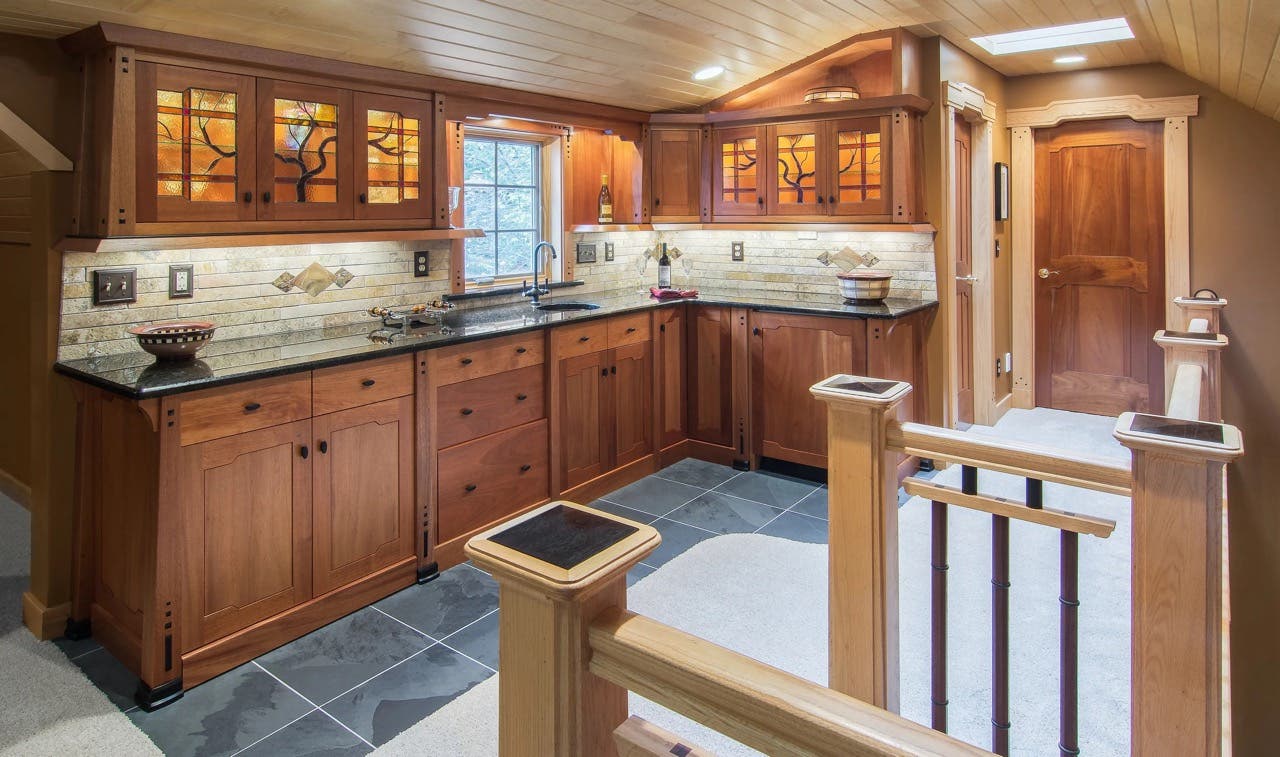Man in the Middle
For 25 years, John Lesch has been the definition of perseverance. As the owner of a one-man furniture shop in St. Louis, he has seen the best of times and,…
For 25 years, John Lesch has been the definition of perseverance. As the owner of a one-man furniture shop in St. Louis, he has seen the best of times and, yes, the worst of times. But due to his original designs, strong technique and numerous commissions from the Chicago market, he has managed to survive.
{loadposition position10}
His shop roots are in an old brick building in the Soulard section of St. Louis, an artsy area just a few blocks away from the Mississippi River. And although he works alone, he does share his shop space with Lita, his rescue dog and loyal companion. He epitomizes the notion of a one-man shop.
"When I got out of college, I had a degree in anthropology from DePauw [University in Green Castle, Ind.]. My first real job was working with handicapped adults in a shelter workshop and they did some woodworking there and that's how I got into it. And I did some stuff in college. If you look back, you could say this guy had some inclination toward working with wood."
And then the spark was lit.
Moving on, on and on
"Before I got married, I went to a school in North Carolina, Catawba Community College in Hickory, N.C. It was totally geared toward the industry, teaching you how to run all the machines, but I think the intention was performance."
While in school, Lesch worked for a small company in Shady Grove, N.C., that made frames for upholstered furniture. Then he headed north and attended the Studio Art Furniture program at the Worcester (Mass.) Arts Center from 1983 to 1984 and apprenticed for Bob March.
"He was influential because he was the first person who was doing what I wanted to do. He was only about five years older than me. He even built his own house out in the country."
Lesch and his wife took turns going to school, and his next stop was Bloomington, Ind., where his wife was a painter and took classes at the University of Indiana. For the young woodworker, it turned out to be a rough few months and then a case of being in the right place at the right time.
"The guy I worked for, he would build these solid top tables and screw it all in so the wood wouldn't move. The pieces would come back six months later with cracks in it and he would say, 'Well, we didn't screw it down tight enough. We'll re-glue it and screw it down tighter.' We had a different way of looking at things. So when I left that job I started working on my own."
Luckily, he found a one-man shop to take over.
"There was a woodworker, who had been living in Bloomington, who moved out at the exact time that I was moving there," he recalls. "He was living on a small farm and turned a barn into a woodshop. I bought a Craftsman table saw for $200, and a new Hitachi planer, which I still have, and a couple of other things. Tool-wise, I don't have much, but I never have."
Windy City connections
Once Lesch had completed several spec pieces, he started knocking on gallery doors in Chicago. But his inexperience showed.
"One gallery owner asked, 'How much do you need for that piece,' " says Lesch. "I gave him some ridiculously low price and he looked at me and said, 'Well, yeah, we'll try and sell that.' So that is how I got my start up there. I started in a gallery called Manifesto, which is still there, and the owner was just getting started. Then I got connected with a couple of clients, including a company called Niedermeyer, which hired me to build a piece."
Through the Sawbridge Gallery, Lesch made more connections with Chicago designers and legendary art dealer Bud Holland. Even after moving to St. Louis in 1988, Lesch has maintained his Chicago contacts. The majority of his work continues to be commissions from the Chicago area.
"For a while, I had a couple of designers who I was working with in St. Louis but, compared to Chicago, it always came down to a struggle with the pricing," says Lesch. "At the end of the whole thing I'd feel like I just barely broke even, and the client would still feel like they paid way too much, so nobody was happy. In Chicago, it's not about the price; it's about [the clients] getting what they want."
Lesch estimates he's one of about 10 custom furniture makers in St. Louis. But despite the good odds, residents of the Gateway City often shop elsewhere for their big-ticket items, he says.
"They have this mixed-up idea that you have to go to New York or Chicago to buy good art. So if they're going to invest in art, they're not going to buy it in St. Louis. The people who spend their money on art are few and far between, and they are doing it partly because they might like the work, but mainly because somebody said that it is a good investment."
Tough times
Lesch has operated as a one-man shop for most of his career, although at one time he had three employees. The current recession has changed his business dramatically.







